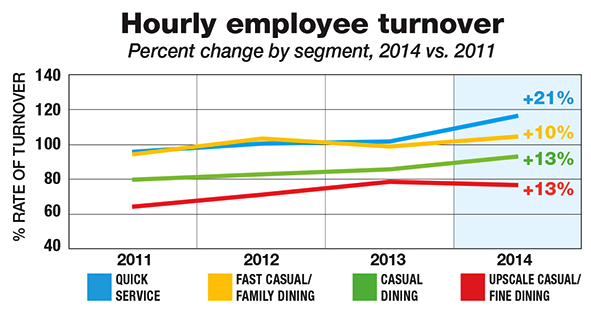Regarding Tuesday’s post, “More About Taxpayers Subsidizing Corporations“, which deals with taxpayers subsidizing the low-wage employees of restaurant chains, long-time blog reader Kevin asks: “Why don’t the folks who flip burgers go out and get better jobs?” Excellent question.
Two thoughts. First, they should move up whenever possible, and the chart below about restaurant employee turnover should lead us to believe that they do move out, if not up. When it comes to workplace changes, everyone deserves the chance to move up into higher positions and therefore, this will increase the rate of employee turnover. Research from Work Institute has suggested that 22% of turnover was due to career development and a higher chance of job growth. Being able to excel in your chosen career can only happen if these people decide to make this change. But, whether they leave or not, those jobs will remain at or below minimum wage, and the taxpayers will continue to subsidize these restaurant corporations who underpay them. It falls to the social safety net to make up the difference. Take a look at restaurant employee turnover statistics:
Source: People Report, a division of TDN2k
The burger flippers turnover is the highest among restaurant hourly employees, and it is growing. These are the people who don’t even get tips, so since employee turnover is the highest where wages are the lowest, it’s the burger flippers who move on. This could also be due to job satisfaction they may feel in the workplace. It could be argued that they do not feel the same level of appreciation within a service profession as they would in an office environment that would buy gifts for employees in order to boost their morale in an attempt to keep them for longer.
A second thought is, what jobs can they move up to? Here is a little background:
The US lost more than 8.84 million private sector jobs in the Great Recession. Now, five years after employment hit bottom in February 2010, private sector employment has returned to prerecession levels. The National Employment Law Project (NELP) indicates in a study that low-wage job creation didn’t just happen in the first phases of the recovery, but today, five years in, job growth is heavily concentrated in lower-wage industries. Lower-wage industries accounted for 22% of job losses during the recession, but 44% of employment growth.
Worse, low-wage jobs account for 100% of the net job growth in the economy. Today NELP reports that there are:
• 958,000 fewer mid-wage jobs than at the start of the recession
• 976,000 fewer high-wage jobs than in 2008
The National Restaurant Association’s 2015 economic forecast says the restaurant industry in 2014 added 1,000 jobs per day. It is projected to provide a record 14 million jobs in 2015.
So, where do the motivated, striving burger flippers go?
The glibertarians say the burger flippers should work hard, save money from their minimum wage jobs, get a better education, and move on to a higher paying job, maybe in an office or a laboratory. OK, that’s possible for some.
They say that Mr. Market determines what the value of a burger-flipping job should be. And, if it isn’t a living wage, the burger flipper should study some more.
But when they move on, odds are that they will move to another low-wage job, more likely than not, in the restaurant industry.
And regardless of what new low-wage job they take, the taxpayers’ subsidy of the Corporatists will continue.


By the way, it would be an entirely different matter if low wage jobs were primarily held by students. When I ran a Kentucky Fried Chicken in Xenia Ohio, our employees were mostly college and HS kids. So the turnover represented partly the movement up the ladder to real employment. A similar situation today exists for some Starbucks, where the staff are a mix of student, moms who have small kids (so don’t want a full time job yet). But fast-food is now an employers of folks who have no other resource, and working in fast food, few will advance to management, nor will they move on to restaurant work. But… a real cashier at McDonalds does translate to a bank tell job (but they can’t have the ghetto girl face!)
bank teller.